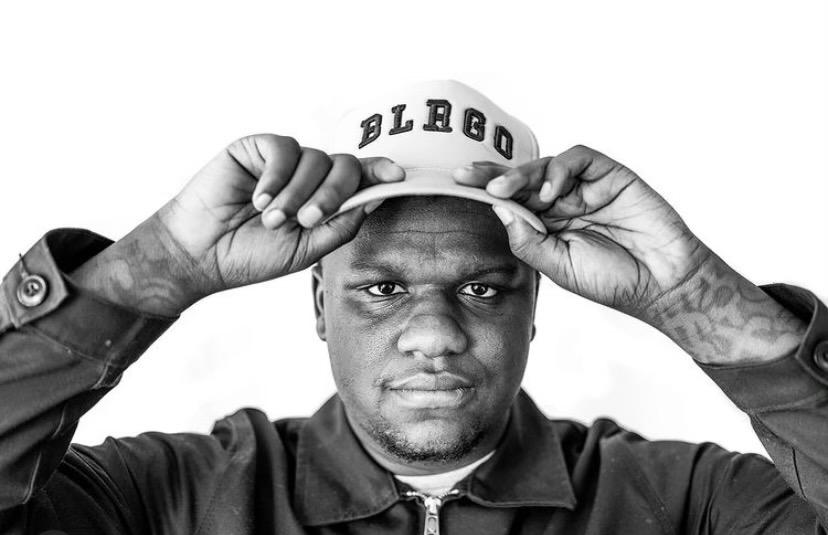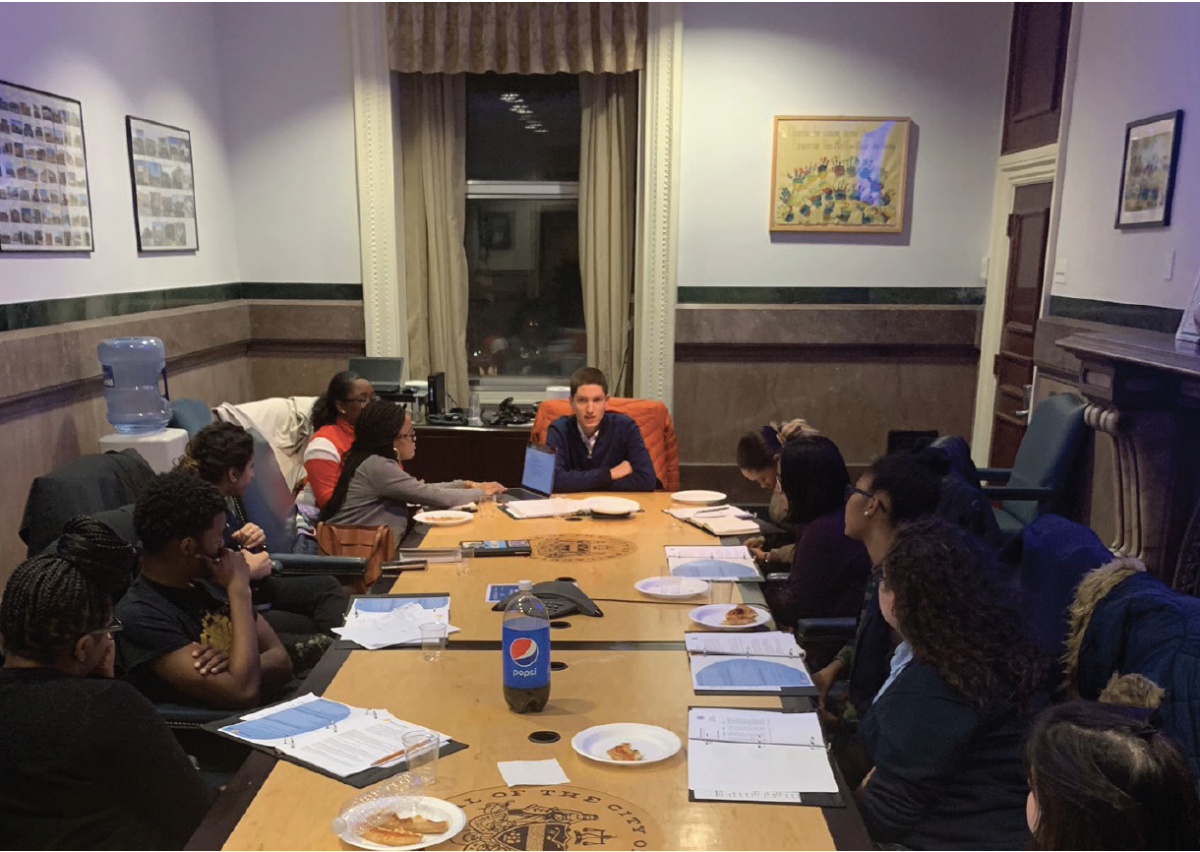
Twenty-year-old Will Bentley wants to make sure kids don’t suffer at the hands of the criminal justice system the same way he did.
At 14, Bentley found himself incarcerated at Philadelphia Industrial Correctional Center (PICC), an adult jail. His case was eventually sent back to the juvenile system, and he spent the next three years in a juvenile facility.
While at the juvenile facility, Bentley was introduced to the Youth Art & Self-Empowerment Project (YASP), a Philadelphia-based organization that conducts art, poetry, music and empowerment workshops in jails and prisons. It was an escape and an outlet for Bentley to express himself.
“[YASP] made me feel like I could be a kid again,” Bentley said. “It made me feel whole again. It made me come back to reality.”
Bentley immersed himself deeply in his work with YASP, and continuously sought to align himself with their mission during those three years. YASP seeks to end youth incarceration and empower young people. They don’t just conduct workshops in jails and prisons, but they stay in the lives of the young people they help once they get out by giving them potential employment opportunities and leadership roles in the organization.
When Sarah Morris, co-founder of YASP, came for the workshops, she told Bentley he would have a home with YASP when he got out of the system. Just before Bentley was scheduled to be released, Terrance (TA) Williams, who was described as “the heart and soul” of YASP and who was also a close friend of Bentley, was shot and killed at 22. YASP had stopped hiring at the time, and in the wake of his friend’s passing, Bentley said he got caught up in the wrong crowd.
At age 17, Bentley was again charged as an adult and incarcerated at PICC. His bail was set at $520,000. To get out of jail, he was required to post 10% or $52,000. According to the Philadelphia Bail Fund, an organization that provides relief for people facing incarceration and has a goal of eliminating cash bail in Philadelphia, the average bail issued in December 2020 was $121,873, meaning $12,187 was needed to post bail.
Bentley said his experience as a teenager in an adult prison still affects him today.
“What we go through, it’s horrible,” Bentley said. “I always tell people, like what you see on TV, is really what prison is like. When you get in that environment, it’s traumatizing. To this day, I feel certain side effects from that time.”
YASP, along with the Philadelphia Community Bail Fund, helped Bentley make his bail after a year in jail. The same week he returned home, he interviewed and was hired by YASP. In the following weeks and months, he spoke at high schools and colleges, and met with city council members. At his trial, the judge took Bentley’s work for YASP into consideration and ruled that Bentley would get no additional jail time.
Bentley said the education YASP gave him while he was incarcerated helped his understanding of the injustices he had experienced personally and gave him a way to fight against them.
“It was always this place for me to go, where I could express myself in different ways,” Bentley said. “YASP gave me a safe space and they had me right there. At that point I wanted to be an advocate to end youth incarceration and ending pretrial punishment. Once I started learning about different systems through YASP, like ending the cash bail system, I realized that the way they’re doing it right now is not working, so we need to try something else, and YASP gave me a way to advocate for those things.”
Now, Bentley is a full-time employee at YASP, running its Youth Participatory Defense Hub, a youth-led space where young people with open court cases, or their families, can get support, talk through how the process works and think about their next steps and strategies to get the best possible outcome for their future, according to the organization’s website.
Bentley works closely with YASP Co-Director Josh Glenn, who said his own experience being incarcerated in an adult prison as a kid is what fuels his activism now and compels him to deconstruct the systems that made him, and kids like him, suffer.
“What drove me to be an organizer was learning the history of America, all of the layers of it and just seeing how a lot has changed but a lot hasn’t changed when it comes to the systems that deal with our people,” Glenn said. “For me, learning all of that, I had to do this. Like what am I living for? I have to be living it and make things better. I’ve seen how the systems operate and I just said we got to change it, just for all of our sake.”

Like Glenn, Bentley continues to live it. He is also an organizer with the Philadelphia Community Bail Fund.
“We’re bailing kids out on holidays, bailing mothers out on Mother’s Day, fathers out on Father’s Day,” Bentley said. “We raise money, and all the money goes towards bailing people out and once they get out, doing things that will benefit them when they come home. Help them get back on their feet. When people get arrested, they lose their housing, they lose everything. So all the money we raise goes towards helping them.”
As an organization, YASP seeks legislative change, specifically repealing Act 33, passed in 1996, which allows youth under 18 to be automatically tried as an adult for a number of crimes. Glenn said his own incarceration as a minor was an opportunity to educate himself on the systems in place in Pennsylvania that allow for laws like Act 33. He has now made it his life work to educate young people to challenge laws that people like him and Bentley were impacted by.
“We need young people that have been through the system,” Glenn said. “We need to empower them to be the ones that take on this work and own this work. And so we hire young people, we pay and train them to be activists and organizers, and we let them take leadership roles in the organization to challenge the laws.”
The U.S. leads the world in sentencing juveniles to life in prison, and Pennsylvania puts more juveniles behind bars for the rest of their lives than any other state.
Michael Lyons Ph.D., associate professor and chair of communications and media studies, is the co-founder of The Redemption Project, which uses storytelling to aid the movement for criminal justice reform in Pennsylvania. In his work, Lyons said he has seen the impact of harsh sentencing on juveniles, and like Glenn and Bentley, believes that legislative change in Pennsylvania is necessary.
“This state decided a long time ago that some kids are just disposable,” Lyons said. “As a society we are thankfully starting to rethink that, but Pennsylvania’s laws are still behind. Children don’t belong in adult prisons. It’s really as simple as that. If we are serious about rehabilitation and giving kids a chance, we can’t send them to prison with adults.”
YASP aims to put people in positions to challenge society’s norms and the laws that accompany them, according to Glenn.
“We equip young people to be the leaders in the community and challenge these laws,” Glenn said. “The system we have right now just doesn’t work, it never worked. Part of our workshops, we still do poetry because it helps young people express themselves and a lot of young people like it. But also we do political education and then we also want to pay young people as soon as they get out to be organizers.”
Bentley and Glenn said their work has led them to conversations with legislators in Harrisburg, District Attorneys across the state, city council members and Philadelphia Mayor Jim Kenney. Still, Bentley admitted that this sort of dialogue can be an uphill battle when those in power are not able to relate to the experiences that people like Glenn and Bentley have had.
“The people that make the laws in Pennsylvania, a lot of them come from rural areas, they’re not coming from the inner city,” Bentley said. “A lot of the legislators that make the laws, they don’t come from this. They don’t come from underprivileged communities. They don’t understand the impact of having kids incarcerated with adults. They don’t understand the effect because it’s not affecting them.”
For Bentley, successfully changing the laws that are in place around youth incarceration and mass incarceration would produce an improved society. He said the astronomic rise in gun violence the city is currently experiencing ties into mass incarceration practices. When discussing his vision, he repeated one word: harmony.
“I feel like if youth incarceration ended, in my eyes there would be harmony,” Bentley said. “There wouldn’t be as much violence. These prisons take away these kids’ uncles, these kids’ aunts, these kids’ parents, any people that can teach these kids the rights and wrongs, they’re not there because of the prison system. They can’t learn right and wrong if no one is there to teach them. That’s what is creating all of this violence in the city, all of these shootings. Ending youth incarceration and mass incarceration would bring back some uncles and some fathers and it would be harmony.”
For this to happen though, Bentley said that programs like YASP need to be in place and properly funded not only to help young people that are or were incarcerated but also to fight oppressive policies.
“I wish there were more innovations in the world like YASP,” Bentley said. “It changed my life and a lot of kids’ lives. I just wish YASP, and other organizations similar to YASP had more funding. If we had unlimited funding our base, and our span and our help and our reach would be so much more.”
Bentley is currently working as the lead organizer for the Care, Not Control campaign, a collaborative campaign with the Village of Arts & Humanities, Juvenile Law Center and the Youth Sentencing & Reentry Project, that aims to end youth incarceration. More information about the campaign can be found on this petition.












































